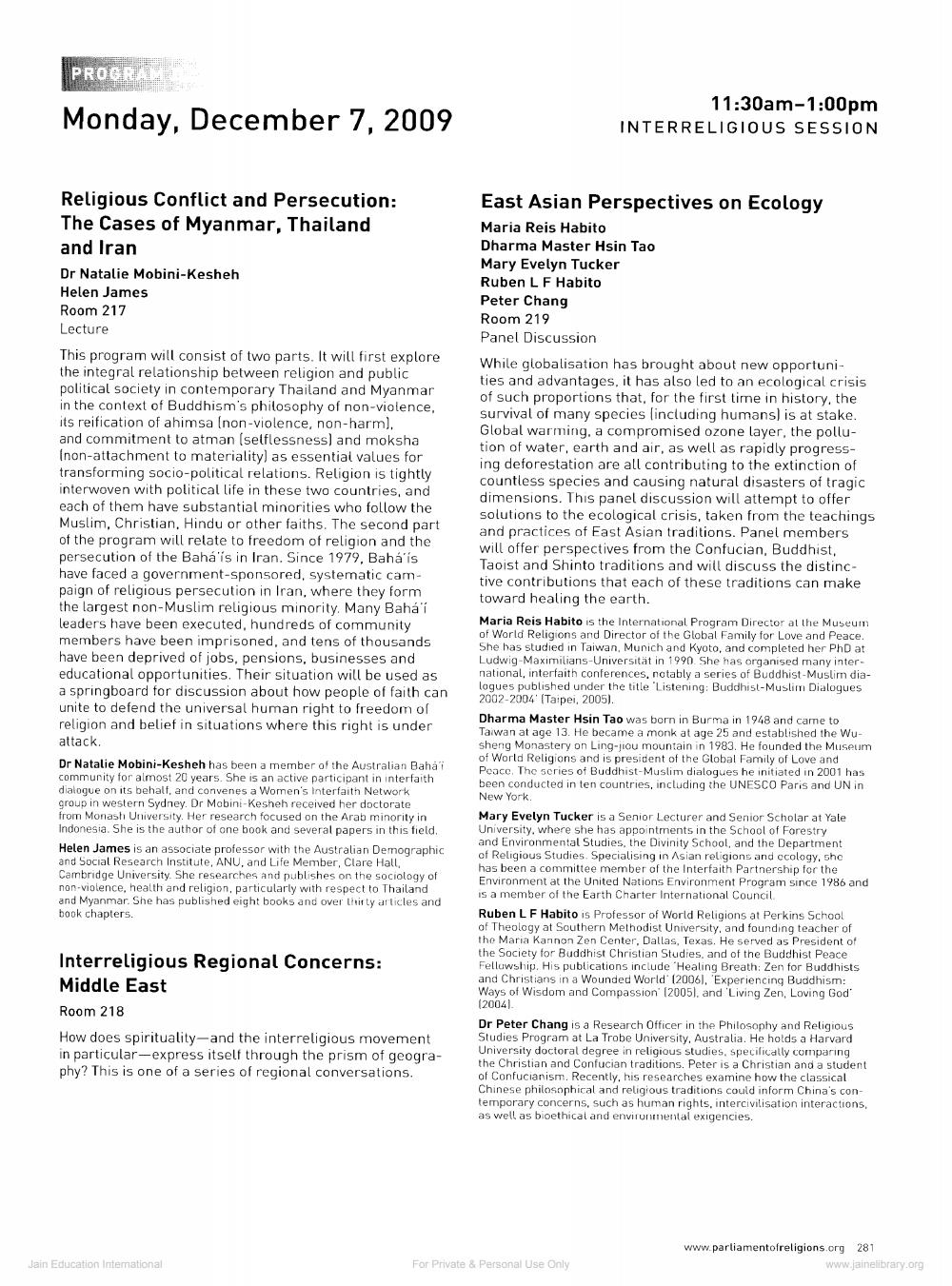________________
PROGR
Monday, December 7, 2009
11:30am-1:00pm INTERRELIGIOUS SESSION
Religious Conflict and Persecution: The Cases of Myanmar, Thailand and Iran Dr Natalie Mobini-Kesheh Helen James Room 217 Lecture This program will consist of two parts. It will first explore the integral relationship between religion and public political society in contemporary Thailand and Myanmar in the context of Buddhism's philosophy of non-violence, its reification of ahimsa (non-violence, non-harm). and commitment to atman (selflessness) and moksha Inon-attachment to materiality) as essential values for transforming socio-political relations. Religion is tightly interwoven with political life in these two countries, and each of them have substantial minorities who follow the Muslim, Christian. Hindu or other faiths. The second part of the program will relate to freedom of religion and the persecution of the Bahá'is in Iran. Since 1979, Bahá'is have faced a government-sponsored, systematic campaign of religious persecution in Iran, where they form the largest non-Muslim religious minority. Many Bahá'í leaders have been executed, hundreds of community members have been imprisoned, and tens of thousands have been deprived of jobs, pensions, businesses and educational opportunities. Their situation will be used as a springboard for discussion about how people of faith can unite to defend the universal human right to freedom of religion and belief in situations where this right is under attack Dr Natalie Mobini-Kesheh has been a member of the Australian Baha? community for almost 20 years. She is an active participant in interfaith dialogue on its behalf, and convenes a Women's Interfaith Network group in western Sydney. Dr Mabini-Kesheh received her doctorate from Monash University. Her research focused on the Arab minority in Indonesia. She is the author of one book and several papers in this field. Helen James is an associate professor with the Australian Demographic and Social Research Institute, ANU, and Life Member, Clare Hall Cambridge University. She researches and publishes on the sociology of non-violence, health and religion, particularly with respect to Thailand and Myanmar. She has published eight books and over thirty articles and book chapters.
East Asian Perspectives on Ecology Maria Reis Habito Dharma Master Hsin Tao Mary Evelyn Tucker Ruben L F Habito Peter Chang Room 219 Panel Discussion While globalisation has brought about new opportunities and advantages, it has also led to an ecological crisis of such proportions that, for the first time in history, the survival of many species (including humans) is at stake. Global warming, a compromised ozone layer, the pollution of water, earth and air, as well as rapidly progressing deforestation are all contributing to the extinction of countless species and causing natural disasters of tragic dimensions. This panel discussion will attempt to offer solutions to the ecological crisis, taken from the teachings and practices of East Asian traditions. Panel members will offer perspectives from the Confucian, Buddhist, Taoist and Shinto traditions and will discuss the distinctive contributions that each of these traditions can make toward healing the earth. Maria Reis Habito is the International Program Director at the Museum of World Religions and Director of the Global Family for Love and Peace. She has studied in Taiwan, Munich and Kyoto, and completed her PhD at Ludwig-Maximilians-Universität in 1990. She has organised many international, interfaith conferences, notably a series of Buddhist - Muslim dialogues published under the title 'Listening: Buddhist-Muslim Dialogues 2002-2004' Taipei, 2005). Dharma Master Hsin Tao was born in Burma in 1948 and carne to Taiwan at age 13. He became a monk at age 25 and established the Wusheng Monastery on Ling-jou mountain in 1983. He founded the Museum of World Religions and is president of the Global Family of Love and Peace. The series of Buddhist Muslim dialogues he initiated in 2001 has been conducted in ten countries, including the UNESCO Paris and UN in New York Mary Evelyn Tucker is a Senior Lecturer and Senior Scholar at Yale University, where she has appointments in the School of Forestry and Environmental Studies, the Divinity School, and the Department cf Religious Studies. Specialising in Asian religions and ecology, she has been a committee member of the Interfaith Partnership for the Environment at the United Nations Environment Program since 1986 and is a member of the Earth Charter International Council Ruben L F Habito is Professor of World Religions at Perkins School of Theology at Southern Methodist University, and founding teacher of the Maria Kannon Zen Center, Dallas, Texas. He served as President of the Society for Buddhist Christian Studies, and of the Buddhist Peace Fellowship. His publications include 'Healing Breath: Zen for Buddhists and Christians in a Wounded World (2006), 'Experiencing Buddhism: Ways of Wisdom and Compassion (2005), and 'Living Zen, Loving God (2004) Dr Peter Chang is a Research Officer in the Philosophy and Religious Studies Program at La Trobe University, Australia. He holds a Harvard University doctoral degree in religious studies, specifically comparing the Christian and Confucian traditions. Peter is a Christian and a student of Confucianism. Recently, his researches examine how the classical Chinese philosophical and religious traditions could inform China's contemporary concerns, such as human rights, intercivilisation interactions, as well as bioethical and environmental exigencies.
Interreligious Regional Concerns: Middle East Room 218 How does spirituality-and the interreligious movement in particular-express itself through the prism of geography? This is one of a series of regional conversations.
www.parliamentofreligions.org 281
www.jainelibrary.org
Jain Education International
For Private & Personal Use Only




